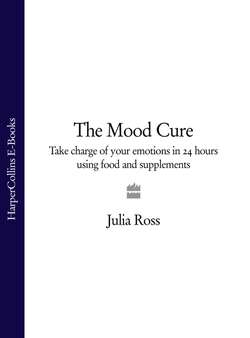Читать книгу The Mood Cure: Take Charge of Your Emotions in 24 Hours Using Food and Supplements - Julia Ross - Страница 78
Other Cat Boosters
ОглавлениеThere are several other natural cat boosters that you’ll want to add to your supplement regimen if you feel that you need a bit more support than either tyrosine or phenylalanine, or both, can provide you.
Actually, all of the basic vitamins, minerals, and fats described in chapter 10 help your brain to convert tyrosine into the catecholamines. The following basics are particularly pro-cat:
Omega-3 fish oil—You’ll certainly need this one. By correcting fatty-acid imbalances in your brain (the brain is 60 percent fat), this supplement can usher out low-cat depression and increase concentration in a hurry. By eating more fish and taking omega-3 fish oil supplements, you can raise your cats by 40 percent! And you may feel the effects very quickly. Fish oil contains DHA and EPA, the brain-activating form of omega-3 fats. (Flax oil is also a good source of omega-3 fats, but less helpful, especially in the brain, for most people than fish oil, because it doesn’t readily convert to DHA or EPA.)
In addition to taking omega-3 fish oil supplements, I recommend that you reduce your intake of vegetable oil (except for olive oil, which is fine), because doing so will help protect your brain’s supply of the vivacious omega-3s. Soy, corn, canola, and other omega-6 vegetable oils compete with the omega-3s for space in the fatty walls of your brain cells and are typically rancid and brain harmful anyway (as you will learn in chapter 7).
Vitamin D—This fat-soluble vitamin is actually a hormone that directs the conversion of tyrosine to cats in both your brain and your adrenal glands. Vitamin D orchestrates much of this action through its relationship with calcium, which is literally at the controls in your brain cells (as well as in your bone cells). Your basic supplement plan, laid out in chapter 10, will explain how to use the omega-3 fats, vitamin D, and minerals like calcium.
Pycnogenol and OPCs—These pine bark or grape seed extracts encourage cat activity in the brain and can be helpful with focus and concentration problems. Try them if you have attention deficits and if tyrosine, phenylalanine, the basic supplements, and eliminating bad-mood foods aren’t enough.15 Take 100 milligrams twice daily.
SAM-e—SAM-e is world-famous for its pro-cat antidepressant effects. We’ve found that about 5 percent of our clients have needed it. This crucial natural chemical is used throughout the body and brain and tends to be too low in some people—for example, in those who have used stimulant drugs. Add 800 to 1,600 milligrams of SAM-e per day, if tyrosine, the omega-3s, and dietary protein don’t perk you up in a week or two.16,17 (SAM-e can also be marvelous for the liver and joints.) If it doesn’t take effect after one bottle’s worth, though, it probably won’t.
You’ll find a recap of all the above supplement suggestions in the Action Steps at the end of the chapter. But before you drop the book and rush to your local supplement supplier, please read the next section and give some thought to whether or not your thyroid is part of what’s giving you the blahs.
